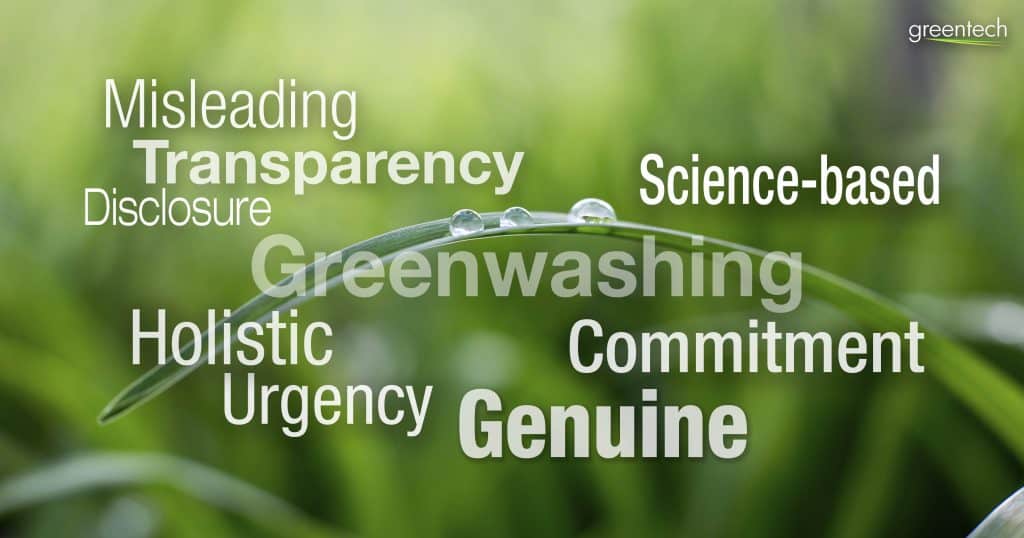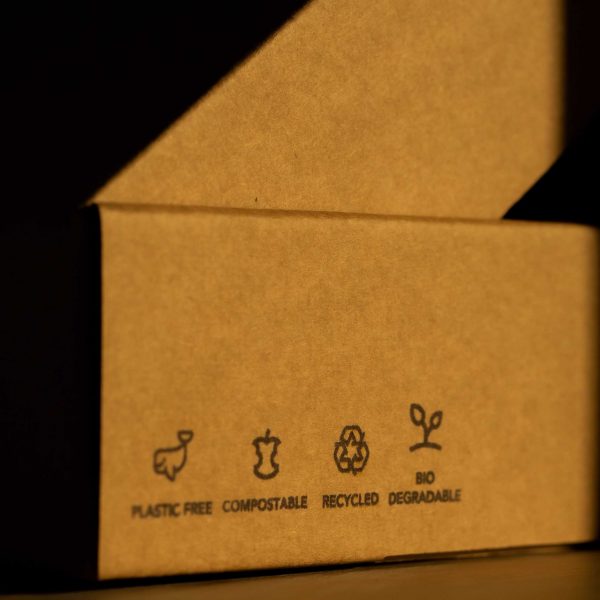November 2021

In the year leading up to COP26, the world has seen an increased sense of urgency around reaching net zero. The latest report by the Intergovernmental Panel on Climate Change (IPCC) not only confirmed that “emissions of greenhouse gases from human activities are responsible for approximately 1.1°C of warming since 1850-1900”, but that global temperatures are expected to exceed 1.5°C sooner than we thought (IPCC, 2021).
In these concerning times, all industries are declaring their commitments to preventing the planet from reaching the point of no return. Although it is promising to see everyone raising awareness in different ways, we have to make sure that these promises are based on science and not empty words.
What is “greenwashing”?
“Greenwashing” is a term that first was coined in the 1980s by an environmentalist named Jay Westerveld. The idea came from his criticism of the “save your towel” movement created by the hotel industry which, although portrayed as a way of reducing water waste, was actually just a way of reducing labour costs spent on doing laundry (Springerlink, 2013).
The concept has since been extended to instances of companies and organisations falsely claiming that their products and services are sustainable. Research shows that consumers are increasingly seeking companies that they can trust to prioritise the planet, with a 2021 YouGov study showing that “57% of UK consumers are willing to pay more for environmentally friendly products” (YouGov, 2021).
It has become very easy for a company to call itself sustainable, be that through trendy terminology or appealing advertising, making it vital that greenwashing is prevented before it can exploit consumers’ passion for saving the planet.

Can it be prevented?
In the UK, the Competition and Markets Authority (CMA) recently published the “Green Claims Code” which will entail full reviews on businesses’ sustainability claims. These reviews will allow the CMA to take action on misleading claims that do not comply with existing consumer law and break codes such as “omitting or hiding important information” (GOV.UK, 2021). By warning businesses that they have until the end of 2021 to prove that their claims are truthful, the CMA is making moves to not let any misstatements slip through the cracks.
The US Securities and Exchange Commission has also taken measures this year to crack down on greenwashing. The Enforcement Division announced its Climate and ESG Task Force to seek out misstatements and ESG violations, placing emphasis on the importance of full disclosure to lock down potential investors (FT Adviser, 2021).
Governments must use their power to put policies in place that prevent businesses from greenwashing, whether it is done intentionally or accidentally. With more regulation, businesses and organisations will be required to be completely transparent about their sustainability and the commitments they are prepared to make.
Are businesses doing enough?
Businesses play an important role in creating a more sustainable society, and face being left behind if they do not demonstrate their commitment to this in their business models. The reality is that the world cannot achieve net zero overnight, so it is to be expected that reaching targets will be a slow process. This makes it ever important for businesses to lay out both their long-term and short-term plans that can be backed up scientifically. Many businesses are launching detailed reports and investment plans to show their commitments. Consumer goods company, Unilever, has been praised for its efforts in releasing The Climate Action Transition Plan which details how the company plans to reach net zero greenhouse gas emissions by 2039.

While they take steps towards this long-term goal they have also put forward The Unilever Climate & Nature Fund, stating that “the world cannot wait till 2039 to begin the work of investing in nature” (Unilever, 2021). A holistic approach like this is essential for businesses as all of the effects of climate change need to be considered equally if we are to reach the ultimate goal of net zero.
Transparency is becoming increasingly important to investors as more and more companies are making sustainability claims. In October, the International Monetary Fund (IMF) called on regulators to step in before companies can make misleading sustainability claims to help protect investors (Financial Times, 2021). The IMF has emphasised that “the sustainable investment fund sector can be an important driver of the global transition to a green economy”, however stronger efforts are required at every level to ensure investment is worthwhile. This makes it vital for businesses to take their net zero strategies seriously, as they could risk losing out on investment that can accelerate their growth.
How can consumers spot genuine sustainability?
As the whole world becomes more tuned into the impact of climate change, consumers are becoming accustomed to companies sharing their stance on climate change. There are certain things consumers can look out for to ensure that they are fuelling genuine sustainability and not enabling companies that are making flimsy commitments.
Businesses can be guilty of pushing campaigns and ideas that are not closely related to what they do as a company. Making general statements about the state of the planet is not enough to protect us from climate change anymore, businesses need to demonstrate real action. If a company puts the time and energy into releasing detailed information about their history, what they are currently doing and what they plan on doing this can be a good indication that they truly care.

Another tactic brands have been guilty of is introducing changes that sound and appear to be ‘green’, but actually have more of a detrimental effect on the planet. One example being when a well-known fast food chain and many other companies switched to paper straws as an eco-friendly alternative in 2018, and it was later realised that these straws actually cannot be safely recycled. Educating the world on genuine alternatives to carbon emitting products is key to catching greenwashing before it takes its toll. The stricter consumers are about how sustainable their products should be, the higher the demand will be for change.
The pressure is on.
The United Nations’ COP26 summit has demanded that all countries lay out how they are going to tackle the very imminent crisis of global warming. The pressure of this milestone has led to an influx of media and advertising dedicated to climate action, making it impossible to avoid the global issues we face.
The world must make sure that the line is not blurred between actionable targets and jumping on trends as we can no longer afford to be slowed down by false or exaggerated claims. It will take everyone from governments, to businesses, to consumers to make greenwashing a thing of the past. Our responsibility as businesses lies in our willingness to make real, environmentally driven changes and offer total transparency to our consumers in return for their loyalty and trust.

Image credits:
marcell-viragh-ZQas4Ehf-F4
noah-buscher-x8ZStukS2PM
meghan-rodgers-NLSvKQTJOz0
nasa-Q1p7bh3SHj8
Source:
Sources:
Climate change widespread, rapid, and intensifying | IPCC
Greenwashing | Springerlink
Global: Consumer willingness to pay for environmentally friendly products | YouGov
Greenwashing: CMA puts businesses on notice | GOV.UK
How US and UK regulators are targeting greenwashing | FT Adviser
Unilever Climate Transition Action Plan | Unilever
Tackle greenwashing to boost sustainable investment, says IMF | Financial Times
© Greentech 2022